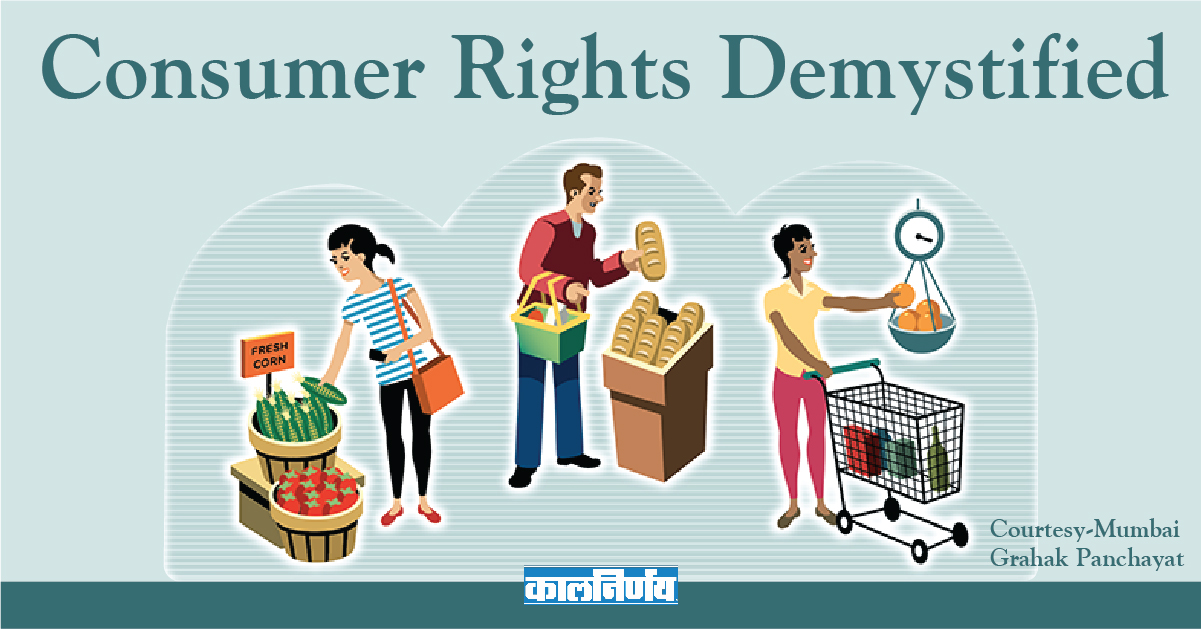Each one of us is a consumer. We consume goods, services or environments and it is natural to have complaints about quality, price, measurement, after sale service, time etc. While we may complain verbally, most of us fail to lodge an official complaint with appropriate authorities due to ignorance. We are unaware of our consumer rights and the procedure to lodge a complaint.
There are three things to remember before you start the process. Be aware of your rights and responsibilities as a consumer. Make sure that your complaint is valid and relevant. The objective should be to improve the system, and hence the complaint should be against the system and not an individual.
Registering a complaint :
Make a written complaint which includes specific information like date of purchase, the problem etc. Do not attach original receipts.
- Avoid using harsh words or allegations.
- When you send the complaint, please make sure you retain the acknowledgement of receipt.
- If you have to send a follow-up letter/reminder, remember to attach a copy of the original complaint about the ready reference.
Where to complain :
Ensure that your complaint reaches the right person or organization.
- In the case of goods, your complaint should first go to the seller. If you do not get a response, complain to the manufacturer enclosing a copy of the earlier complaint. If the manufacturer does not respond, write to the manufacturers’ cells or representing organization enclosing a copy of the complaint made earlier.
- In case of services, complain systematically right from the lowest to the highest officers.
- Avail facility of consumer complaint cells of business and public sector organizations.
- When direct complaints bring no response, write to consumer organizations.
- Governmental authorities like Drug controller, MRTP Commission, Weights and Measures Officers, The Consumer Forum etc. can also be approached.
- The court of law is the last resort. Make sure you have all the facts, documents and information ready for this.
Writing A Complaint :
- Collect and organize facts
- Identify the party responsible
- Find a person authorized to solve the problem.
- Identify strong arguments
Cover the following in your letter :
- What is the dispute about?
- Why the party is being approached?
- Your preferred resolution of the dispute: E.g. satisfactory repair/refund/replacement for goods.
- A time limit for resolving the dispute.
- The indication of proposed action if the complaint remains unresolved.
The letter must also contain :
- Your full name, address, and signature.
- Description of product (model number/serial number)
- Place of purchase.
- Date of purchase and price paid.
- Warranty period, if applicable.
Redressal of Grievances By Statutory And Non-Statutory Bodies.
A) Redressal Machinery Under Monopolies & Restrictive Trade Practices (MRTP) Act. Consumers who have suffered loss or injury due to monopolistic, restrictive and unfair trade practices can approach the Commission established under the MRTP Act. Following scenarios come under unfair trade practices.
- Making False representation: Any statement, oral, written or by visible representation, which makes a false claim regarding the quality, quantity, composition, durability, utility, price etc. of goods and services.
- Price discount: Denying a consumer an announced discount or offering it for a short period on a small number of goods.
- Competition and Gift Schemes: Announcing competitions and free gift schemes to increase the sale of goods, where the cost of the “free” gift is wholly or partly included in the price, or the prizes are not given as promised.
- Supply or sale of unsafe or hazardous goods.
- Hoarding goods or destroying them with the intention of raising their prices.
When and how to approach the MRTP Commission?
Those who come across any practices mentioned above may approach the Director General of Investigation & Registration (DGIR) MRTP Commission. The complaint can be made individually or through a consumer organisation registered under the MRTP Act. There are no prescribed forms or fees for lodging a complaint. An ordinary letter recording the complaint along with evidence should be sent to the DGIR.
The DG will then investigate the complaint. If found genuine, a formal complaint will be lodged before the Commission. The advocate of DG (paid for by the Govt. of India) argues the case on behalf of the complainant. The presence of complainant is not required. The provisions of the redressal machinery under the Consumer Protection Act are :
- All type of consumer complaints e.g. against defective goods, overcharging, deficiency in service etc. can be filed in one place.
- Nominal fees may be charged for filing the case before the forum.
- You do not need a lawyer. The complainant or an authorized representative may represent the case. However, you may engage a lawyer if you so desire.
- No official format is prescribed for making a complaint.
- Regulation 11(3) – If the opposite party asks for adjournment the forum will allow it at a cost based on the nature and urgency of the complaint.
- The Complainant is entitled to receive a copy of the judgment free of cost.

